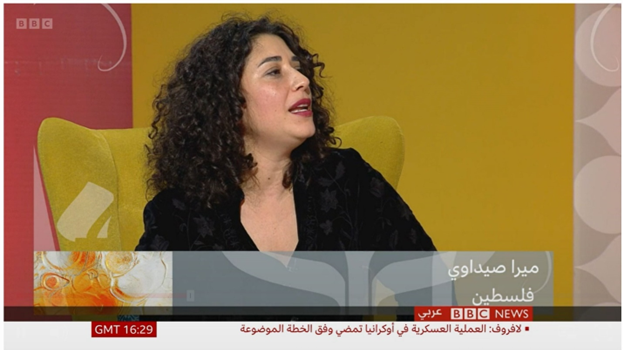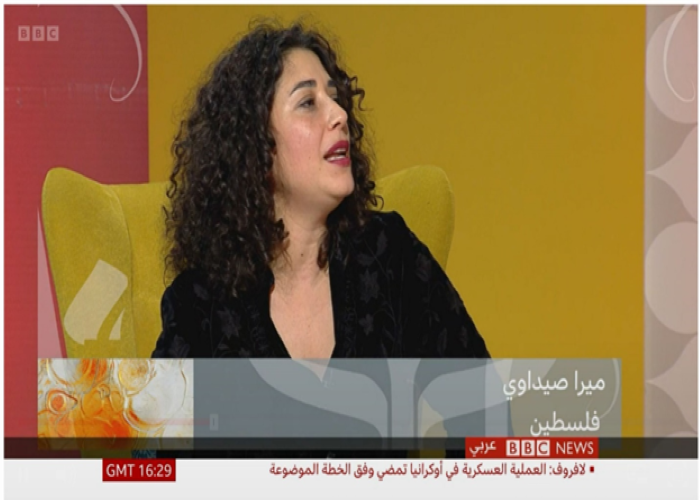A post by CAMERA Arabic
Mira Sidawi is an actress, writer and director born in the refugee camp of Burj al-Barajneh in Lebanon to a Palestinian family. She regularly participates in BBC Arabic’s women’s magazine “Dunyana”, where she is presented as coming from “Palestine” despite the instructions on the use of that term in the BBC Academy’s style guide on Israel and the Palestinians (since May 2021 online access to the guide is restricted to BBC personnel only; latest publicly visible edition is from February 2021).

Although none of the contributors of “Dunyana” officially bears the title “host”, in many episodes Sidawi is the person opening the program and letting the viewers know that “our time is up” when it concludes. Hence in practice she is the show’s host in these cases and should be regarded as such in relation to the BBC’s impartiality standards.
In one episode with the theme of traditional Middle Eastern food which was originally broadcast in January 2022, Sidawi said the following: [emphasis in bold added]
Sidawi: “The Palestinian cuisine in particular, it also engages in resistance, like the Palestinian people as a whole. Because it is a cuisine subject to domination, and to- they try-“
Guest: “correct, correct”
Sidawi: “Israel tries to assume domination over the Palestinian cuisine, with a view that- I mean, it is funny that usually the occupation leaves a mark on the peoples. I mean, it leaves…the French leave their mark on the food, in different [parts of] the world. The occupier, I mean. Israel does not leave any mark of its own, because it does not have any [mark to leave], it is compelled to take from the original peoples.”
As short as this segment is, Sidawi’s claims – especially her assertion that Israel “does not have any [mark to leave]” – illustrate a widespread Arab nationalist perception of Jews in Israel also found among BBC Arabic staff.
Sidawi’s attempt to deny the existence of Israeli food so matter-of-factly (in all likelihood, without having set a foot in Israel in her life) should be viewed within the framework of an ongoing anti-Zionist campaign that is several years old. Its supporters often attribute Israel’s culinary landscape in its entirety to an imaginary Palestinian arcadia in which Shakshuka, Sabich, Hummus and Falafel with Sauerkraut as an add-on were commonly consumed long before the emergence of Zionism. Ostensibly copyrighted by generations of peaceful Arab villagers based on their inalienable indigenous rights, all these dishes were supposedly then violently appropriated by “European” Israel.
Secondly, it comes in a broader context of denying all aspects of Jewish indigeneity in the Land of Israel, with BBC Arabic having engaged in such denial numerous times in the near past. Three notable examples: unquestioningly depicting the location of the Jerusalem Temple until 70 AD as something “the Jews claim”; misleadingly portraying a tiny faction of Ashkenazi, anti-Zionist Haredim from West Jerusalem as the representatives of “Palestine” in a program about “Jews of the Arab Mashreq”; and anachronistically labeling the two major population groups in Mandatory Palestine as “Jews” and “Palestinians” even though Jews and Arabs alike were both considered Palestinian at the time. The latter false nomenclature was even backed by BBC complaints director Richard Hutt in a March 2021 letter to CAMERA Arabic, under the pretext it is not “materially misleading” audiences.

However, Sidawi stands out even against this backdrop. By comparing Israel to France and arguing that unlike others, Israeli Jews have nothing to contribute to the local cuisine of the place they “occupy”, she is taking one further step down the path of singling them out from other nations. To her, not only are Israel’s Jews not native in Palestine, they hardly belong anywhere else either and hence have no mark of their own to leave even as they colonise a land that is not theirs (such as the French in, say, Vietnam, Louisiana or elsewhere).
The practice of declaring every Palestinian cultural field as “original”, “authentic” and “legitimately owned” – in contrast to the respective “artificial”, “hijacked” or “plundered” Israeli one – carries disturbing echoes of the antisemitic stereotype whereby the Jew is incapable of creating anything authentic and is hence doomed to steal, forge and mimic the works of creative others and thus destroy them and their culture.
Related Articles:
BBC TRAVEL POLITICISES FOOD TO PROMOTE A NARRATIVE
BBC TRAVEL SERVES UP POLITICISED NARRATIVE IN FOOD ITEM YET AGAIN





